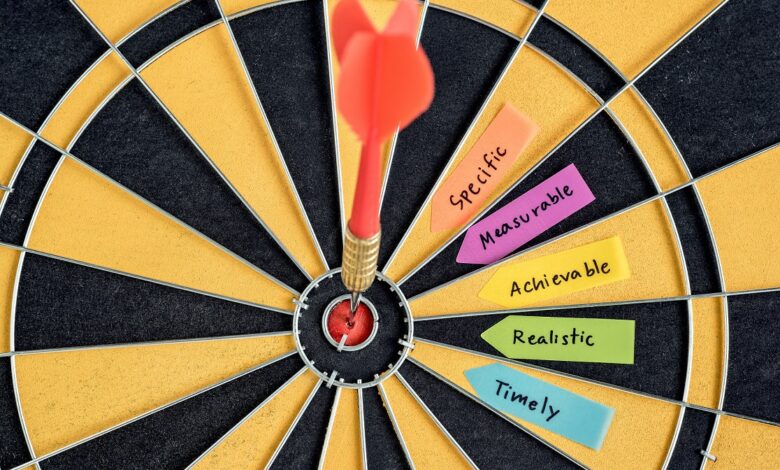Setting Goals to Improve Your Career

Goal setting is a powerful process of outlining your future and motivating yourself to fulfil that vision. It indicates that you know exactly which path to follow. You are well aware of the areas where you have to put maximum effort and you will also be able to spot the distractions in your way.
Setting clear, attainable goals can help you improve your career and accomplish great things. Whether your goals are to increase your productivity at work or become the CEO of a corporation, the only way to attain them is to have actionable goals.
Professional Development Goals
You can improve your career by setting professional development goals. The goals that you set should be based on your current situation and unique career aspirations. Goals can be related to a promotion, improving your communication or time management skills, obtaining a new degree or certification, growing your professional network, completing a leadership training course or any other aspiration related to advancing your career.
Why is it important to set Professional Goals
Setting goals is important because it gives you a framework to achieve milestones. It gives you the much needed start and also the pathway. You gain a long-term vision. You will be proud of your achievements and your self-confidence will be raised as you recognize your ability and competence.
● Establishing goals helps you know about your long-term aspirations and motivates you to take the necessary steps to fulfil them.
● Setting goals helps you hone your current workplace skills, get better and grow in many new and different ways. This ultimately makes you a better employee and you are bound to achieve even more success in your career.
● By setting goals, you leave a lasting impression on your employers as they highly value employees who are dedicated towards their job and seeking betterment in their career. It will open the door to greater opportunities.
● Setting goals boosts productivity by instilling a steady stream of motivation. This is especially true when you break a goal into smaller tasks and work in order to complete them within a definite time frame. Even a small but steady progress encourages you to push through and finish the job.
Short-term goals and Long-term goals
Short-term goals are more immediate goals that you set for achieving your long-term goals. Short-term goals are actually stepping stones and require about 1-3 years for completion. For example, completing small tasks or projects. Whatever you accomplish in this short term will be helpful in completing your long-term goals.
Long-term goals are attained over several years by achieving many short-term goals along the way. For example,being promoted to a certain level.
How to set Professional Development goals
● Decide your end goal
Think about your end goal. Where do you picturize yourself in the next five or ten years? What is your desired job title? Which industry do you want to be in? What do you want to accomplish? If you are clear about your end goal, you can create smaller goals that will lead you to your destination.
If you are in doubt, take a look at your most recent performance evaluation and see what your employer recommended you improve upon. This way, you can have a solid goal and make the required improvements.
● Use the SMART goal method
This is a tried-and-true-goal-setting model. Your goals can be achieved if they have the five key elements – Specific, Measureable, Attainable, Relevant and Time-bound.
○ Make your goals as clear and detailed as possible.
○ Define how you will measure success and what evidence will prove that you are making progress and reevaluate when necessary.
○ Make sure you can reasonably accomplish your goal within a certain time frame. This will keep you motivated and focused. You should understand the full scope of your goal ahead of time to ensure it can be accomplished. You might have to set short-term goals.
○ Make sure your goal is relevant, meaningful and aligns with your values and contributes towards your long-term goals. There should be no doubts in your mind regarding your goals.
○ Set a timeline to achieve your goal. The time frame will keep you motivated and on-schedule. Before you set the end-date, be sure to research all the milestones and hurdles you may come across along the way. Your goal must be reachable within the stipulated time period.
● Break the larger goals into smaller tasks
If you break your large goals into bite-sized tasks, chances are more of you continuing to pursue those goals. The smaller tasks can be completed each day or week. Check off each task on completion.
● Review your progress regularly
It is important to check on your goals and review your progress because it’s quite easy to lose sight of long-term goals. When you realize you are progressing towards each goal, you are ensured you are on the right path and that boosts your motivation.
Setting professional development goals will help give a framework and path to a successful career and life. Employers often ask about your goals in interviews. You should be prepared to talk about your goals and present yourself as a focused and goal-oriented employee.




